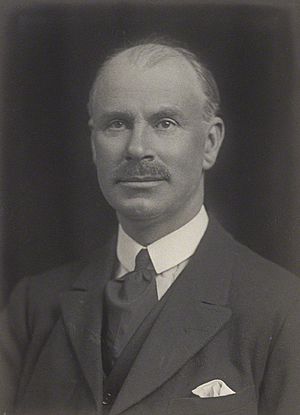Edward Grigg, 1st Baron Altrincham facts for kids
Quick facts for kids
The Lord Altrincham
|
|
|---|---|
 |
|
| Governor of Kenya | |
| In office 10 February 1925 – 27 September 1930 |
|
| Monarch | George V |
| Preceded by | Edward Denham (Acting) |
| Succeeded by | Henry Monck-Mason Moore |
| Personal details | |
| Born | 8 September 1879 Madras, Madras Presidency, British India (now Chennai, Tamil Nadu, India) |
| Died | 1 December 1955 (aged 76) Tormarton, Gloucestershire, England |
| Nationality | |
| Political party | Liberal, then Conservative |
| Spouse |
Joan Dickson-Poynder
(m. 1923) |
| Children | 3, including John Grigg |
| Alma mater | New College, Oxford |
| Occupation | Journalist, civil servant |
| Military career | |
| Allegiance | |
| Service/ |
|
| Years of service | 1914–1920 |
| Unit | Grenadier Guards |
| Battles/wars | First World War |
Edward William Macleay Grigg, 1st Baron Altrincham (born September 8, 1879 – died December 1, 1955) was an important British leader. He worked as a colonial administrator, helping to manage British territories, and was also a politician. He was known as the first Baron Altrincham.
Contents
Edward Grigg's Early Life and Education
Edward Grigg was born in Chennai, India. His father, Henry Bridewell Grigg, worked for the Indian government. Edward went to school at Winchester College and then studied at New College, Oxford University. He was very good at writing Greek poetry.
After college, he started a career in journalism. He worked for The Times newspaper and later for The Outlook. He also helped edit The Round Table Journal, a magazine about British territories.
Military Service During World War I
When the First World War began, Edward Grigg joined the Grenadier Guards, a famous British Army regiment. He quickly moved up in rank, becoming a lieutenant-colonel by the end of the war. He fought bravely in France.
He received two important awards for his courage: the Military Cross in 1917 and the Distinguished Service Order in 1918. After the war, he worked for Prince Edward (who later became King Edward VIII). He traveled with the prince on tours to Canada, Australia, and New Zealand.
Edward Grigg Enters Politics
In 1920, Grigg became a private secretary to David Lloyd George, who was the Prime Minister at the time. He greatly admired Lloyd George.
After Lloyd George left office, Grigg decided to become a politician himself. In 1922, he was elected to the House of Commons as a Liberal MP for Oldham.
In 1923, Edward Grigg married Joan Dickson-Poynder. They had three children:
- John Edward Poynder Grigg (1924–2001), who became a journalist and writer.
- Annabel Desirée Grigg (born 1931).
- Anthony Ulrick David Dundas Grigg (1934–2020).
Governor of Kenya Colony
In 1925, Grigg left Parliament to become the governor of Kenya, a British colony in Africa. His job was to help manage and develop the colony.
He worked hard to improve farming, education, and roads in Kenya. However, he believed that the local African people were not ready to govern themselves. He also made it illegal for certain traditional practices to continue in the colony.
Edward Grigg Returns to British Politics
After his time in Kenya, Grigg returned to Britain in 1930. He decided to go back into politics. In 1933, he was elected as an MP for the Altrincham area. He served as an MP until 1945.
During this time, Adolf Hitler and the Nazi movement were gaining power in Germany. Grigg was worried about this threat. He wrote books arguing that Britain needed strong defenses.
When World War II started, Grigg joined the government. He held several important roles, including working for the Ministry of Information and the War Office. In 1944, he became the Minister-Resident for the Middle East.
Later Life and Legacy
After the war, in 1945, Edward Grigg was given the title of Baron Altrincham. This meant he became a member of the House of Lords, which ended his career in the House of Commons.
He later became the editor of the National Review magazine, a job he held until 1954. Edward Grigg passed away in 1955 at the age of 76. His son, John Grigg, later gave up the title of Baron Altrincham.
Edward Grigg's Published Works
Edward Grigg wrote several books, sharing his ideas and experiences:
- The Greatest Experiment in World History (1924)
- Unity (1935)
- The Faith of an Englishman (1936)
- Britain Looks at Germany (1938)
- The British Commonwealth: Its Place in the Service of the World (1944)
- Kenya's Opportunity: Memories, Hopes and Ideas (1955)
Images for kids



